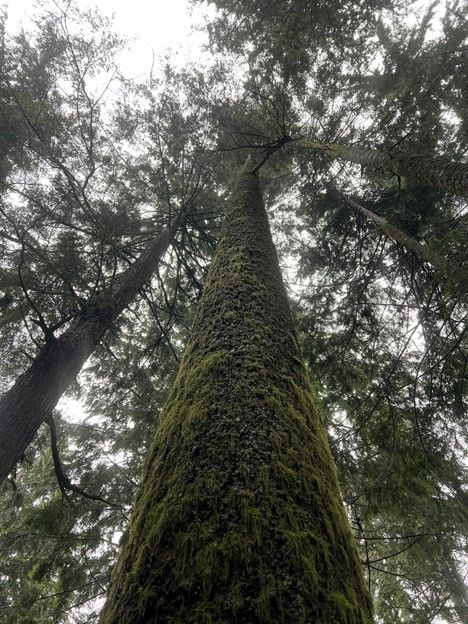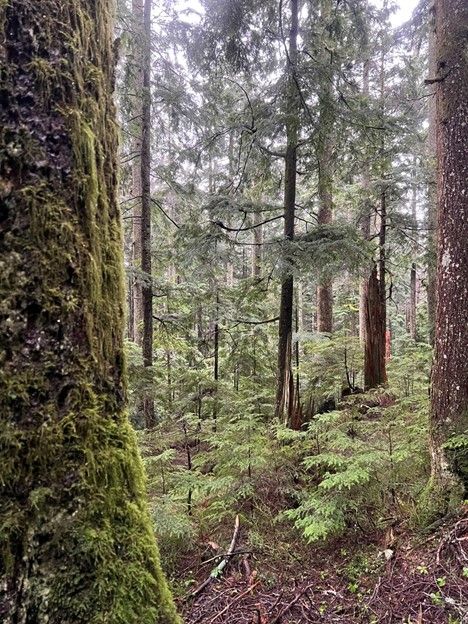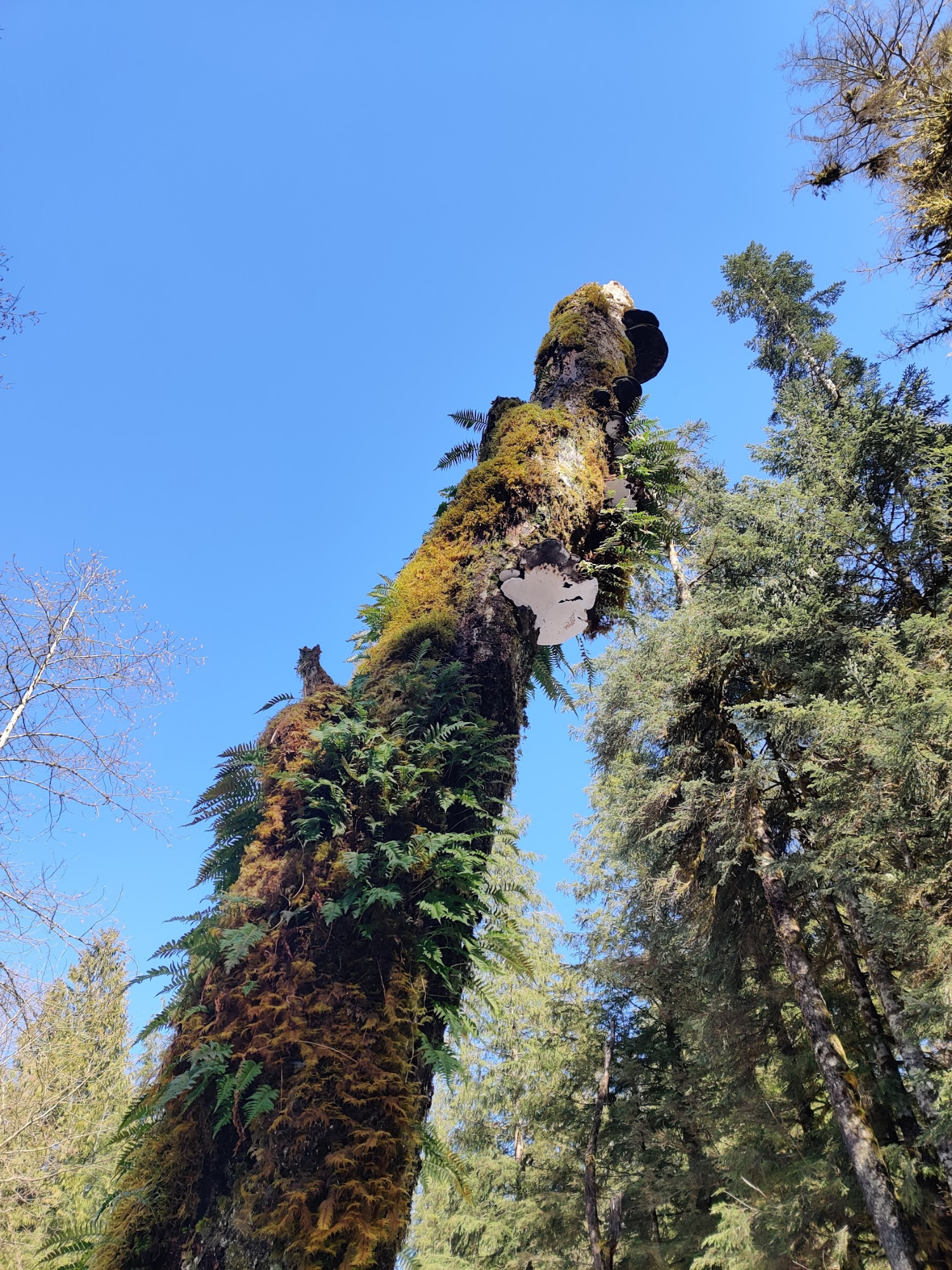
We collect basic website visitor information on this website and store it in cookies. We also utilize Google Analytics to track page view information to assist us in improving our website.
Written by: Heather Schibli
During a recent visit to Vancouver, my colleague Steve Hill and I had the great pleasure of exploring a small section of the woods by West Vancouver with Future Ecologies producer and co-host Mendel Skulski. Enthused by our collective fascination for the living world, we trekked our way up one of the slopes within a quiet and damp coniferous forest during a cool Saturday morning. Mendel helped orient us east-coasters to the wonders of west coast fungi, trees, and herbaceous plants as we talked science, art, and ecology. Mendel struck me as both genuine and playful as we bantered between particular fungi drawing his attention to a rotting log or a fallen leaf. His passion is contagious. I later followed-up with some questions to better learn about his brilliant podcast Future Ecologies and how he navigates his love for nature during a time of global ecological collapse.

Heather Schibli: Before Future Ecologies, what did you do? What did you study?
Mendel Skulski: I studied Industrial Design at Carleton University. Around the time that I graduated, I began to suspect that I probably wasn't going to be able to help the world through the production of physical objects. Despite that inkling, I found intermittent work in short-run design and fabrication: occasionally making movie props, display solutions, public artworks, and an experimental silviculture apparatus.
Photo by Heather Schibli.
HS: What led you into studying and working within ecology?
MS: It may not be possible to pin this to a moment. In some ways it feels like everything fits under the umbrella of "ecology", so there is literally nothing else to do but study it and work within it. On the other hand, maybe that's just the outlook I grew up with in Vancouver. I was lucky enough to be introduced to vibrant living spaces when I was a kid — even 'just' Stanley Park, Pacific Spirit Park, and the North Shore mountains clearly shaped my affinity for things I couldn't find in the human-built environment. At University, this interest manifested in my auditing a course in the Natural History of Ontario with Prof. Mike Runtz, my deep appreciation for Prof. John Buschek's Energy and Sustainability, and my admiration for designers like Neri Oxman challenging the a/biotic dichotomy. I also owe much of my fundamental understanding of biology to Prof. Robert Sapolsky's lectures on YouTube (a life-changing experience). After university, I pursued a fascination with fungi, and that has taken me pretty far.
 HS: How did you come about developing Future Ecologies?
HS: How did you come about developing Future Ecologies?
MS: Adam had the idea to submit a podcast as one of the final projects for his Environmental Studies degree, and his partner suggested that he should ask me to co-host. We had already established a shared appreciation for high-production audio storytelling and traded in recommendations. That first episode (on fire) would eventually be released as FE1.4. We enjoyed the process of making it so much that we set out on a road trip, gathering interviews which would become almost all of Season 1. These were the days before Adam scored his dream job at the Galiano Conservancy Association, so he had lots of time to dedicate to the podcast: researching, interviewing, writing, editing, sound designing, and scoring. It still amazes me how much he can do. In Season 1, I was mostly just writing parts of scripts, reading my lines, and offering a bit of critique. Since mid-Season 3 that workload has flipped, but Adam still manages to contribute more than I can comprehend.
Photo by Heather Schibli.
HS: How do you select your speakers?
MS: Sometimes they find us! Obviously, it depends on the story, and then who we can discover and contact, but it's usually the people who are publishing on the topic. A good interview usually produces several new leads.
How much time do you devote, on the average week, to the podcast?
Depends on the week, but anywhere between 20 and 60 hours. I'm probably not as efficient as I could be, but I hope that my processes will continue to improve and that we will someday have the means to pay me (and ideally some additional editing/production staff) a living wage.
HS: What are you most passionate about?
MS: Sound itself. Of course, I still love mushrooms and the living world, but there's something so deeply exciting about this intersection of physics, math, computer science / electrical engineering, and perception. As I slowly become a better listener, I become a better musician and a better podcast producer. Maybe a better storyteller too.

HS: How do you deal with climate anxiety and biodiversity loss?
MS: I avoid thinking about it by distracting myself with work, cannabis, and making music. I also process it in more healthy ways with frank conversations with friends (both within and without of book club, currently reading Vanessa Machado de Oliveira's "Hospicing Modernity"). Besides that, I sit with 2 paradoxes: (1) that I spend most of my time making artwork about the living world while almost completely insulated from it in my windowless studio, and (2) that the shrinking diversity of the planet's habitat and inhabitants is outpaced (in my subjective experience) by a growing awareness of its beauty and complexity.
Photo by Mendel Skulski
HS: What are some of your favourite podcasts?
MS: Obvious inspiration for Future Ecologies comes from huge shows like Radiolab, Love + Radio, 99% Invisible, and Here be Monsters. I'm a regular listener to The Wind, the Joy of Why, New Models, The Allusionist, Why We Bleep, No Such Thing as a Fish, and Universe Today, among others. My favourite recent addition is The Great Simplification.
Join our email list to receive occasional updates about Network of Nature and ensure you get the news that matters most, right in your inbox.